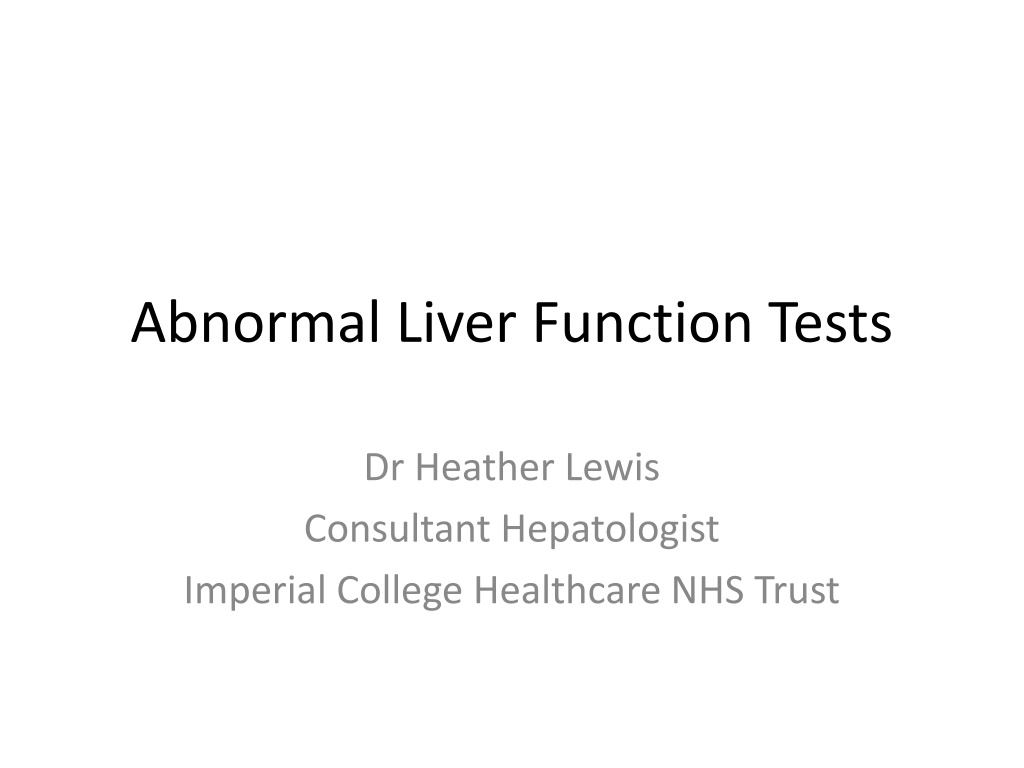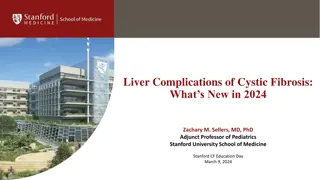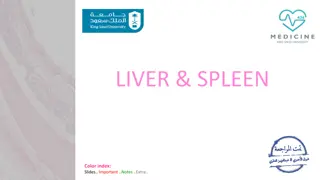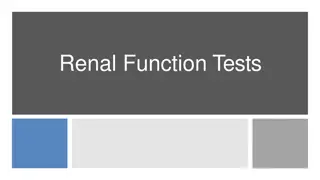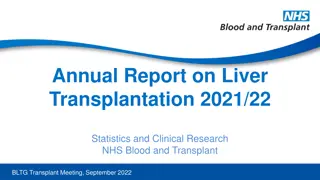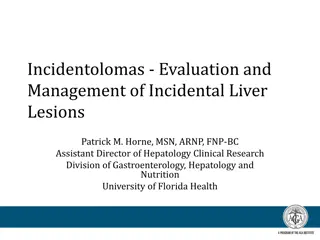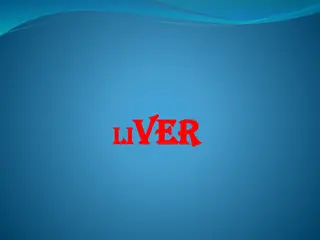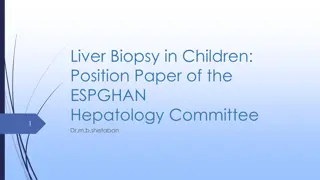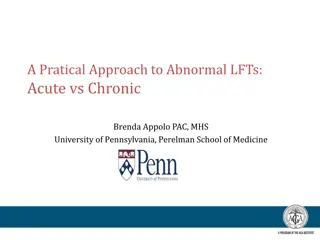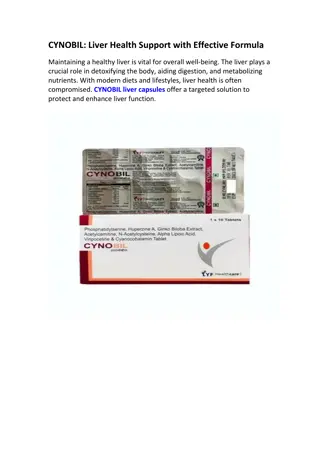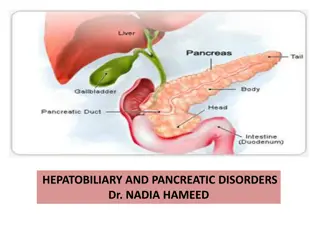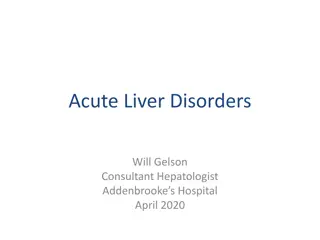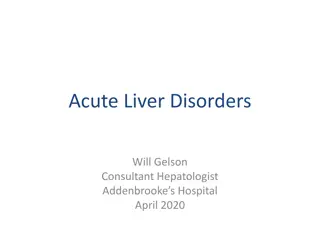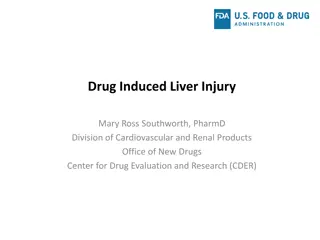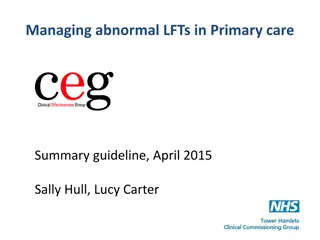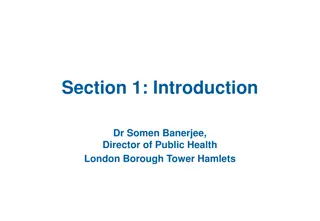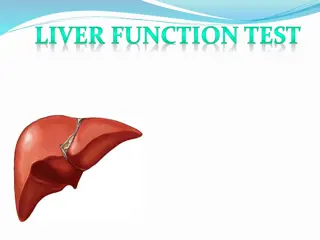Understanding Abnormal Liver Function Tests: Insights from Dr. Heather Lewis, Consultant Hepatologist
Abnormal liver function tests can be a perplexing issue with various underlying causes. Dr. Heather Lewis, a renowned Consultant Hepatologist at Imperial College Healthcare NHS Trust, sheds light on the significance of liver function tests, liver enzymes, and blood markers in diagnosing liver conditions. Understanding the implications of abnormal LFTs and the need for risk stratification is crucial in providing specialized care for patients with liver abnormalities.
Download Presentation

Please find below an Image/Link to download the presentation.
The content on the website is provided AS IS for your information and personal use only. It may not be sold, licensed, or shared on other websites without obtaining consent from the author. Download presentation by click this link. If you encounter any issues during the download, it is possible that the publisher has removed the file from their server.
E N D
Presentation Transcript
Abnormal Liver Function Tests Dr Heather Lewis Consultant Hepatologist Imperial College Healthcare NHS Trust
Mortality from liver disease in the UK The Lancet 2014
Liver function tests vs liver blood tests Bilirubin, albumin and INR are the only blood markers of liver function ALT, AST, ALP and GGT are liver enzymes indicating level of ongoing liver injury Platelets may indicate level of fibrosis Liver disease is silent
Abnormal LFTs 30% GP LFT requests have at least one value outside reference range Only 3.9% of those with raised ALT or AST have significant liver disease 84% of adults still have an abnormal test when repeated 1 month later BALLETS study Prospective cohort study 2 years Birmingham and Lambeth, 11 GPs, common protocol
Abnormal LFTs Dear Colleague, Reason for referral: Thank you for your review of this 44 year old lady who has persistently deranged liver function tests with an elevated ALT of 79 U/L and ALP of 175U/L on her most recent blood tests this month. She has undergone a liver screen last year which was negative and an abdominal ultrasound scan revealed no liver pathology (report copied into the end of this letter and available to view on the ICE system along with her liver screen blood tests). I have arranged an interval repeat blood test so you will have an up to date idea of the trend but would appreciate your specialist review.
Risk stratify the LFTs Is there synthetic failure? Bilirubin, Albumin, INR Could there be malignancy? Weight loss, severe jaundice Anaemia (FBC) Recommendation: check FBC, albumin, bilirubin, ALT, AST, ALP, GGT
Liver Ultrasound: key questions Is there cirrhosis? Irregular liver edge Splenomegaly Is there cancer? Primary liver cancer Hepatocellular carcinoma or cholangiocarcinoma Secondary metastases Is there biliary obstruction? Extra hepatic duct dilatation? Are there gallstones? Intra hepatic duct dilation?
Raised transaminases If liver screen negative: If ALT remain abnormal Is this fatty liver Drug and alcohol history NAFLD if USD shows fatty change or other metabolic RF If no fat and no metabolic RF refer to hepatology if ALT still abnormal after 3/12 If Fatty liver fatty liver pathway
Bilirubin Check Conjugated/unconjugated LFT with GGT FBC Gilbert s if normal FBC, normal LFT and [conjugated fraction <30% ] or the majority of the elevated bilirubin fraction is unconjugated Don t refer If bilirubin >85 umol/l or unconjugated bilirubin > 40 consider Crigler- najar refer
Alkaline Phosphatase If check GGT ; if GGT normal consider: Bone disease including Vit D deficiency, fractures, Paget s, metastases Physiological: bone growth, pregnancy If GGT then likely liver origin; arrange Ultrasound Autoantibodies Consider heart failure, drug causes Refer hepatology if liver origin and if increasing / >150 / clinical concern Refer to HPB medicine if suspect biliary disease eg dilated biliary tree, gall bladder pathology
Isolated GGT Low specificity but good correlation with liver mortality Causes: obesity, excess alcohol, drugs Action: Check BMI/ metabolic RF/ alcohol hx/ Ultrasound, AST, FIB 4 /NAFLD score Refer as per alcohol or NALFD Guideline
Statins and abnormal LFTs 3% of patients on statins will develop elevated ALT (not sig higher than placebo) NAFLD patients undergoing statin Tx did not have higher ALT than those on placebo In 326 patients with well compensated liver disease, and ALT elevations up to 5x ULN no difference in ALT elevation between placebo and statin Tx group
Questions? heather.lewis4@nhs.net
